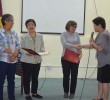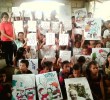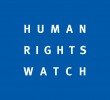Press Statement
19 March 2013
The International Federation of Social Workers (IFSW) with the International Association of Schools of Social Work (IASSW) and the International Council for Social Welfare (ICSW), these three global organizations of professional social workers have declared October 19 as 2013 World Social Work Day. Since the last four years World Social Work Day has been observed in various countries, including the Philippines. Country-specific commemoration every third Tuesday of March since then marks the varying ways of building and rebuilding images of social work.
The theme for this year’s World Social Work Day, Promoting Social and Economic Equalities, is apt especially for developing and struggling countries when the United Nations Human Rights Council affirmed that the Millennium Development Goals failed to address inequalities. Issues of relevance to social determinants of inequalities continue to haunt social workers, the Philippines Social Workers, not exempted.
Recent expressions of World Social Work Day point to social workers’ dilemma whether to celebrate it or not. Noteworthy, Greece’s social work educators and practitioners have decided not to celebrate but to confront their concrete conditions: economic crisis expressed in austerity measures. Austerity measures are likewise happening and being opposed increasingly by United Kingdom’s social service providers. Critical social workers remain steadfast in supporting service-users, those in the lower rung of the economic ladder, to fight for a genuine and long lasting response to the country’s financial crisis.
While social workers grapple to balance practice wisdom with the demands of the people for humane, cost effective and efficient social service delivery, the state machineries and duty bearers and their allies have a tight grip over the system that actually favours profit-oriented policies of the international financial institutions aligned with the first world countries. Social work is not spared from this domination as it swings towards mechanistic, procedural, technical and managerial tasks in its practice.
Recent developments in Philippine social welfare such as conditional cash transfer and super cyclone Pablo, not to mention typhoon Sendong, relief and recovery assistance issues pose challenges to social work. These challenges tend to divide the growing number of social workers in the country. Perspectives and ethics in social work are put to a test in a socio-political context with a system that breeds historic poverty.
Interestingly, there are community-based organizations, sectoral and multisectoral formations, and grassroots people’s coalitions that have been demonstrating capacities to advance their public policy demands to change and improve their conditions.
Concretely, the Pablo survivors’ display of competence to address social service delivery gaps and meet their needs are steps towards realizing human rights to which state’s primary social welfare and development institution, the Department of Social Welfare and Development, has initially regarded as mere tactics not of the Pablo survivors’ level but the left-oriented organizations. Such underestimation of empowering actions bereft of genuine concern for the issues at hand.
Thus, on the occasion of the World Social Work Day, social workers in Davao City have unified to forge their untiring involvement in social movements and social transformation in the last two decades or so by formally launching: Social Workers in Mindanao for Social Transformation (SWIM).
Basically, the defining distinction of social workers in SWIM will be their continuous positioning in:
a. prompt and appropriate delivery of social services
• call to action for prompt and appropriate responses of government agencies to the victims and survivors of natural and human-made calamities, cases as those afflicted by Pablo in the provinces of Compostela Valley and Davao Oriental;
b. civilian supremacy (military soldiers must stay in their barracks)
• Expose and oppose irregularities in the delivery of social services to the survivors of calamities such as the rationing of relief goods in Baganga,Davao Oriental, allegedly, done by the government soldiers;
c. respect for human rights and support people’s call for good governance
• Human rights violation- on people’s right to assembly as their venue of ventilating impatience to the delayed delivery of social services , such as the assembly staged in Montevista on January 15, 2013, afterwhich, the leaders of the people’s organization called Barug Katawhan and the cause-oriented development organizations supporting them were charged for public disorder, and to cow fear among those standing for the people’s entitlements, Cristina M. Jose, a staunch Pablo survivor and spokesperson of Barug Katawhan in Baganga , was mercilessly shot and killed in front of her 11 years old daughter on March 4, 2013;
• Organize social workers and allied professions committed in taking the side of the empowered critical mass pulling through their legal entitlements;
• Facilitate relevant forums for the advancement of people’s agenda on genuine socio-economic-cultural reforms and issues relevant tohuman rights and social justice as integral to the practice of the social work profession.
• Advocacy on resumption of peace talks between the Government of the Philippines and the National Democratic Front.
We are therefore inviting social workers in Mindanao to join this wave of social workers guided by the ethical principles of social work, human rights and social justice opting to serve our marginalized sectors.
Mainitong pagsaludo sa mga social workers nga nagabarug alang sa tinguha ug kasiguruhan sa mabagang katawhang nagilaid sa kalisud!
For reference:
Florie May Butiong-Tacang, RSW
092183867










